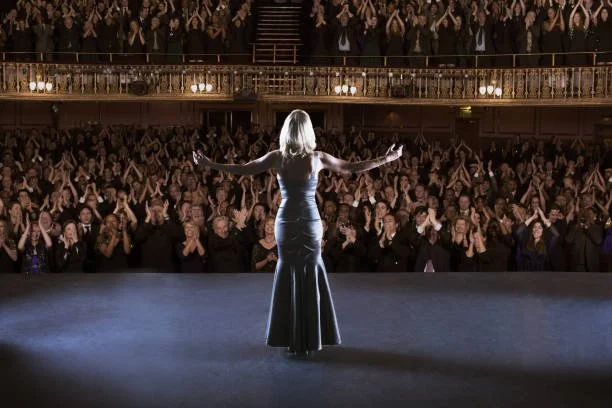Exploring Theatre Hot Takes: Let Middle-Aged Women Take Center Stage
by Chris Peterson
Theatre people always have opinions and sometimes those opinions come in hot. Recently, I put out a call on social media asking for your boldest, spiciest theatre takes, and the responses did not disappoint. From thought-provoking critiques to eyebrow-raising declarations, you gave me plenty to chew on.
So here’s what we’re going to do: I’ll be exploring as many of these submissions as I can in this column series. Some I may agree with, others I may not, but that’s the fun of it. Theatre thrives on conversation, and even the most out-there hot take can lead to surprising insights and fascinating discussions.
Think of this as an open forum, where no opinion is too bold to examine. Ready to dive in? Click on the “Exploring Theatre Hot Takes” tag at the bottom to keep up with every installment.
This comment, from Megan Gifford, has been circling my head: “Middle-aged women are the lifeblood of theater, yet almost zero stories are centered in their experience. I don’t want to play Mama Rose or the loving grandmother.”
She’s right. Let’s be honest, if Broadway and regional theater shut their doors to middle-aged women tomorrow, the art form would collapse in a week. They buy the tickets. They run the booster clubs. They organize the fundraisers, subscribe to the season packages, drag their friends, and fill the seats on weeknights when no one else will. They are, quite literally, the backbone of theater’s survival.
And yet, the message theater keeps sending them is clear: thank you for your money, now please sit quietly in the dark while we tell someone else’s story.
When they do get to be onstage, it is almost always in the margins. A doting mother. A comic sidekick. A plot device to showcase someone else’s growth. The few iconic roles for middle-aged women, Mama Rose in Gypsy or Joanne in Company, are brilliant but coded in sacrifice, bitterness, or the looming shadow of irrelevance. They are cautionary tales, not celebrations. It is no wonder women look around and say, “I don’t want to play her.”
But here is the contradiction that gnaws at me: these women are not just theater’s consumers. They are theater’s pulse. They are the ones who know what it means to balance careers, raise families, navigate heartbreak, start over, age ungracefully, age gracefully, reinvent, survive. In other words, they are the drama. The very stuff theater is supposed to be about.
So why aren’t they at the center of our stories?
Part of it is the age-old sexism baked into the industry. Leading men in their forties and fifties are still cast opposite ingénues young enough to be their daughters. Men are allowed to age into gravitas, women are told to fade into the background. A forty-five-year-old man on stage is commanding. A forty-five-year-old woman? Past her prime. It is insulting, and worse, it is boring.
Theater thrives on complexity. Who carries more complexity than a middle-aged woman? Who has lived enough to have scars, resilience, humor, and rage all sitting in the same sentence? Who has stories of reinvention and persistence that audiences would devour if given half a chance?
And let’s talk business for a second. If producers are so worried about putting people in seats, then centering the very audience demographic that already buys the tickets seems like the smartest move possible. Middle-aged women are not asking for charity. They are asking for representation. For characters who reflect their lives back at them in a way that is truthful, messy, funny, heartbreaking, and real.
Imagine the plays and musicals we are missing. The midlife divorce story told not as tragedy but as rebirth. The woman returning to a dream she shelved at twenty-two. The executive, the activist, the caregiver, the widow, the lover, the fighter. Roles with teeth, roles with center of gravity, roles that refuse to apologize for existing. Theater is supposed to hold up a mirror to life. Right now, that mirror is cutting out the very people who keep the lights on.
And the longer we ignore them, the more we risk alienating the audience that has been most loyal to us. We talk endlessly about how to grow new theater audiences, but we ignore the fact that we have already neglected the most steadfast one. Middle-aged women show up even when the weather is bad, even when the critics are unkind, even when the storylines on stage do not acknowledge them at all. They keep coming because they love the art form. But love can only be taken for granted for so long before it begins to fade.
So yes, middle-aged women are the lifeblood of theater. And they deserve to see themselves not as background characters in someone else’s story, but as the protagonists of their own. It is past time we give them center stage.
Because if we do not, we will keep clapping politely at the same tired archetypes while the real drama, the real brilliance, walks right past us and out the theater door.
